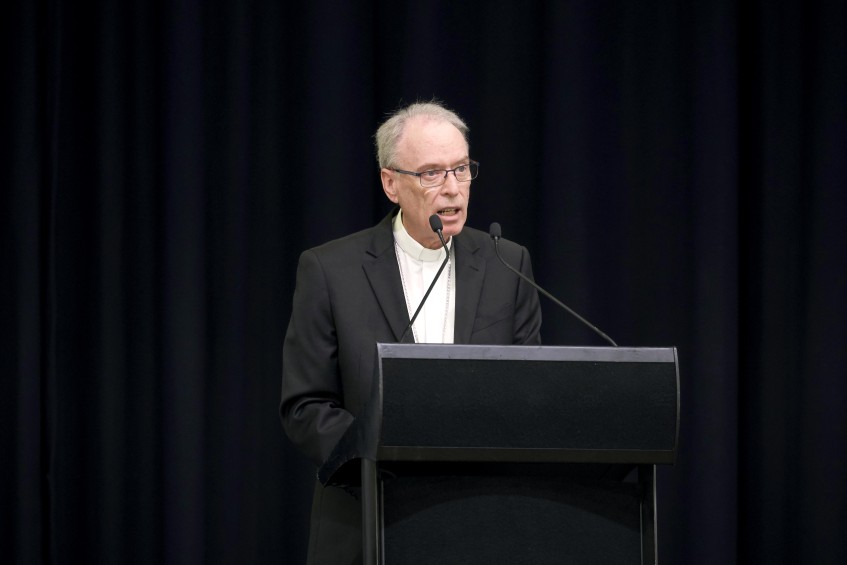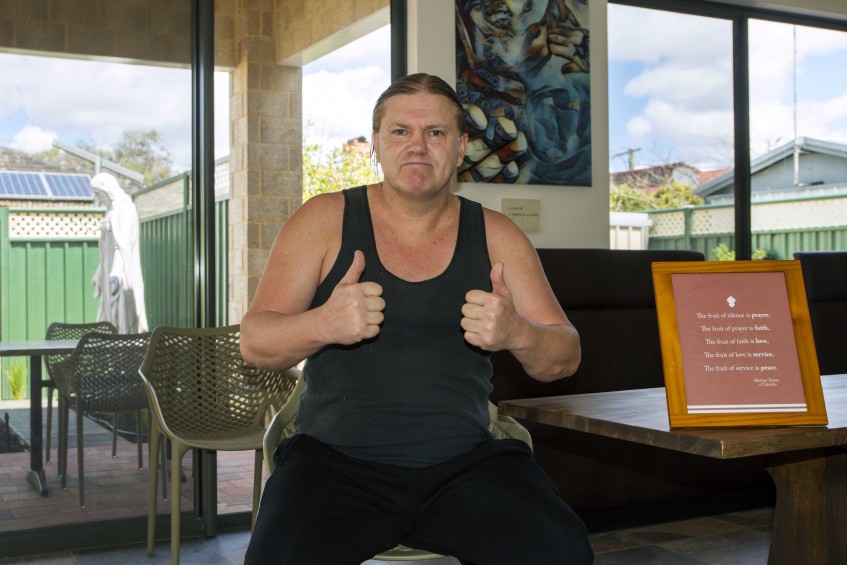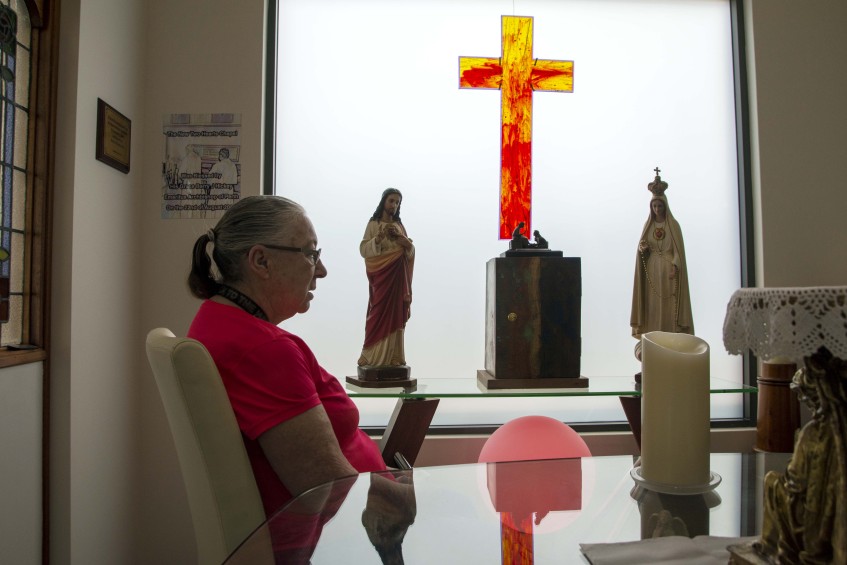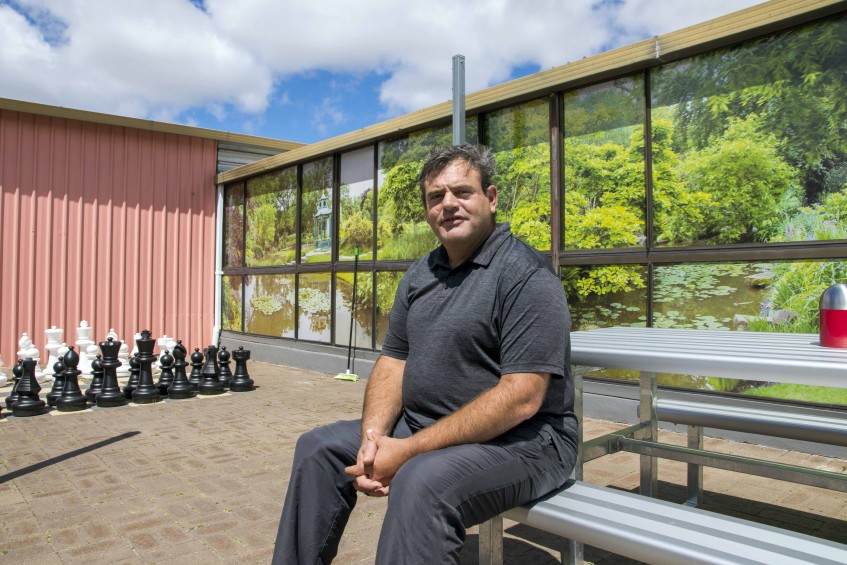MENTAL HEALTH WEEK 2018 – Emmaus members open up on psychological illness stigma

Archdiocese of Perth Auxiliary Bishop Donald Sproxton VG has penned an epistle on 1 October to speak about this year’s National Mental Health Week. Photo: Ron Tan.
By Matthew Lau
The theme of this year’s Mental Health Week speaks strongly of who we are called to be as Church – a living vibrant Christian community of people supporting and walking with each other on our earthly journey together.
These are the words of Perth Auxiliary Bishop Don Sproxton who has this week released a moving Pastoral Letter to the Catholics of Perth and beyond ahead of Mental Health Week.
The annual event, which runs from 7 to 14 October, coincides with World Mental Health Day on 10 October, and is this year themed “Share the Journey”.
Statistics from 2017 show that close to one in five Australians have experienced symptoms of a mental health issue.
“Despite the progress made over the past decade, he said, the stigma associated with mental illness still exists in our community,” Bishop Sproxton wrote in his Pastoral Letter.
“People living with a mental illness are often isolated, have difficulty accessing employment, and have disrupted family, social and peer networks as highlighted in the recently launched Australian Catholic Bishops' Social Justice Statement for 2018-19, ‘A Place to call Home’.”
Emmanuel Centre Co-ordinator Barbara Harris said awareness of mental health and the need to provide welcoming and supportive environments for those who experience challenges is growing.
“People with mental health issues are often given a label which takes away the person’s human dignity and stops us from seeing the gifts and abilities that each individual has,” Mrs Harris said.
“After all we all have difficulty managing things and making decisions at some point in our lives,” she said.
“At the Emmanuel Centre, through the parish wellness and support groups, as part of the Catholic Mental Health Support Network, we have been blessed to learn of the strength that each person, each relationship and each action can bring.
The Emmanuel Centre is a self-help centre, run for and by people with disabilities and their families.
Continuing his Pastoral Letter, Bishop Sproxton said that improving our communication around mental ill-health and suicide is vital as stigmatising language can prevent people from seeking help.
“Mental health and wellbeing crosses language and cultural divides,” Bishop Sproxton expressed.
“By supporting individuals and families holistically and in partnership, we build stronger communities that flourish as a whole.”
The best way people can spread the word about positive mental wellbeing and seeking support needed, Bishop Sproxton explained, is by attending or holding a local event or awareness activity in parishes, workplaces or schools during Mental Health Week.
“I ask that your parish community take the opportunity on the weekend of 6 to 7 October to prayerfully consider the issues around mental health that our brothers and sisters experience in our midst.”

Chronic fatigue syndrome has had a huge impact on Steven Barrett’s life. Photo: Matthew Lau.
‘We are all different, it does not matter’
Steven Barrett has been a member of the Emmaus Community in Queens Park since August.
The Emmaus Community is a Eucharistic-based community providing long-term independent living and support for people who live with mental illness.
At 21, he was diagnosed with chronic fatigue syndrome. Years later he contracted Ross River virus, golden staph infection, and high lead mercury poisoning – all of which snowballed into issues with anxiety and depression.
Mr Barrett sought help to improve his emotional wellbeing in 2012.
“I’d never heard of all these symptoms before, it was all new to me. I had to spend a lot of time in my bedroom too – all these things I found out were ‘The Four Wall Syndrome’,” he said.
After running on a treadmill for three minutes as a subject in a world university study conducted by experienced cyclist Rod Evans, it was found that his lactic acid levels were equivalent to a triathlete’s at the end of a race.
The 47-year-old’s previous occupation was as a limousine driver, a job he describes as “a privilege to make sure people got home safely”. He had aspirations of becoming an airline pilot.
Prior to moving to Emmaus, Mr Barrett resided at a boarding facility called Ngulla Mia – a Noongar word meaning “Our Place”.
“It has been a beautiful journey. I’ve met a lot of unwell people, some of the things that have happened to them are astounding,” he expressed.
“To be there among all these amazing people who help you at the hospital, they are ‘Earth angels’. What a privilege to be unwell, to be in a hospital environment with all these awesome people helping others get better.”
As a devote Catholic, Mr Barrett believes miracles do happen. He said he has been involved in more than 15 car and truck rollovers, all of which he walked away from without a scratch.
“I’ve had a very spiritual journey. There seems to be an invisible world so beautiful, so kind, you can’t see, smell, feel, or touch.”
It is an uphill battle for Mr Barrett as he strives to overcome depression and anxiety, to which, he told The eRecord, is not easy when one wakes up “mentally unwell” each morning.
His day can slowly improve by small acts of positivity from others, which is as simple as people saying “have a lovely day” to him.
“Don’t suffer … it’s okay to ask for help. A lot of these symptoms is a chemical unbalance.”

Catherine McGee has been diagnosed with schizoid personality disorder. Photo: Matthew Lau.
‘The Holy Spirit must have touched me’
Catherine McGee, a member of Emmaus for 13 years, takes daily medication to control her schizoid personality disorder.
“I am no longer battling with my demons each day, that time has passed,” the 71-year-old said gratefully.
“Without medication, I start bawling my eyes out and go further into depression.”
Ms McGee gave birth to two children by the time she was 25. She became a Catholic later in life as her condition worsened and following the fallout of her divorce.
“I had so many problems – there was nowhere else to turn. My faith has helped me a lot.”
There was a defining day during the nadir of her life, she recalled, when she believed she had a spiritual experience.
“The Holy Spirit must have touched me. Ever since that day, I pray and go receive Communion. I know He is there, I am not alone,” she stated.
Ms McGee moved into the Emmaus Community after becoming unable to live alone as her paranoia was impairing her psyche. Her daughter and son visit her from time-to-time.
“I am now in a very happy place. The fact that I am not alone; I get along with my housemates.”

Garry McMurdo experiences the after-effects of PTSD and is bipolar. Photo: Matthew Lau.
‘Thank God I am here’
At the age of 27, Garry McMurdo was diagnosed with Bipolar Type 1, and now suffers from post-traumatic stress disorder (PTSD) as a result of multiple assaults.
He has resided at the Emmaus housing for the past three months in an attempt to subdue his depressive symptoms.
Mr McMurdo spent most of his adult life employed as a butcher from the age of 14 to 38. He had to stop working after a Methicillin-resistant Staphylococcus aureus (MRSA) virus infected his knee bone during a surgery, forcing amputation of his leg.
“To be honest with you I’m here [at Emmaus], so I’m not managing [my mental health] well. It’s unfortunate that I have to be in a supported environment,” he said.
“What brought me here was the assaults.”
The 43-year-old lost his independence after falling victims to two major assaults, one of which was a home invasion where he was severely bashed with an iron bar.
“After the assaults I lived in constant fear, my mental health deteriorated. Over the past year there have been improvements.”
Mr McMurdo went into a depressive episode to the point of hospitalisation, which was subsequent to an overdose from his disillusionment. Thinking he was going to be attacked by a machete-wielding gang, he attempted to take his own life in “a more humane way”.
“I have seen things in my disillusions that are intense,” he told The eRecord.
A Catholic man all his life, Mr McMurdo believes each individual has his or her own unique relationship with religion.
“Talking to the Creator is a personal relationship that you have. I just take the time to thank God I am here, because there are many times I could’ve gone.”
Life now looks brighter for Mr McMurdo living with the Emmaus Community.
“We have all been through a rough road; mental health isn’t a hindrance in the sense that we go through things together,” he added.
“Emmaus Community allows us to talk about our personal issues in a comfortable place with people who understand – I enjoy that.”
Read the Pastoral Letter by Clicking Here
